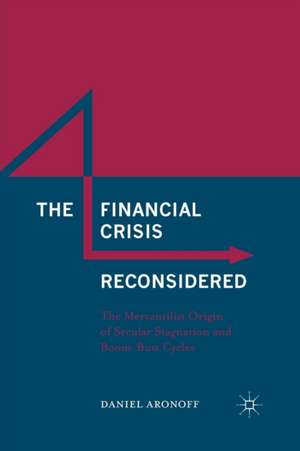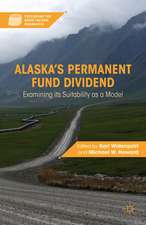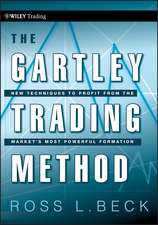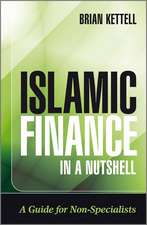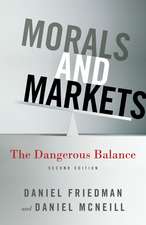The Financial Crisis Reconsidered: The Mercantilist Origin of Secular Stagnation and Boom-Bust Cycles
Autor Daniel Aronoffen Limba Engleză Paperback – 5 iun 2016
Aronoff proposes a novel theory to account for the ultimate origins of secular stagnation and economic volatility. He shows how accumulation, which occurs when a person or country earns more than it ever plans to spend, generates both an excess of saving and a deficiency in demand. While savings provide the funds to promote booms, under-consumption ensures that these booms will turn bust and that the economy will fall short of its potential growth rate. Aronoff argues that mercantilists and top income earners engage in accumulation, and that the influence of both types has grown in recent decades. Combining economic theory and historical narrative, this book offers a new perspective of the housing boom and the financial crisis, concluding with innovative policy proposals to reduce accumulation without compromising the benefits of a market economy.
| Toate formatele și edițiile | Preț | Express |
|---|---|---|
| Paperback (1) | 641.71 lei 6-8 săpt. | |
| Palgrave Macmillan US – 5 iun 2016 | 641.71 lei 6-8 săpt. | |
| Hardback (1) | 647.40 lei 6-8 săpt. | |
| Palgrave Macmillan US – 20 ian 2016 | 647.40 lei 6-8 săpt. |
Preț: 641.71 lei
Preț vechi: 754.95 lei
-15% Nou
Puncte Express: 963
Preț estimativ în valută:
122.79€ • 128.55$ • 101.60£
122.79€ • 128.55$ • 101.60£
Carte tipărită la comandă
Livrare economică 05-19 aprilie
Preluare comenzi: 021 569.72.76
Specificații
ISBN-13: 9781349575473
ISBN-10: 134957547X
Pagini: 291
Ilustrații: XVII, 291 p.
Dimensiuni: 155 x 235 x 18 mm
Greutate: 0.45 kg
Ediția:1st ed. 2016
Editura: Palgrave Macmillan US
Colecția Palgrave Macmillan
Locul publicării:New York, United States
ISBN-10: 134957547X
Pagini: 291
Ilustrații: XVII, 291 p.
Dimensiuni: 155 x 235 x 18 mm
Greutate: 0.45 kg
Ediția:1st ed. 2016
Editura: Palgrave Macmillan US
Colecția Palgrave Macmillan
Locul publicării:New York, United States
Cuprins
PART I: THE CURRENT ACCOUNT DEFICIT, THE HOUSING BOOM, AND THE FINANCIAL CRISIS
1. The Metamorphosis of China's Trade Policy
2. Current Account Deficits, and the US Housing Boom
3. Mercantilism and the US Current Account Deficit
4. The Current Account Deficit: A Necessary Condition for the US Housing Boom
PART II: THE CAPITAL FLOW BONANZA, THE CREDIT EXPLOSION, AND THE HOUSING BOOM
5. A Review of Explanations for the US Housing Boom
6. Decision Making During the Housing Boom
7. The Capital Flow Bonanza and the US Housing Boom
8. The Role of Policy During the Housing Boom
PART III: ACCUMULATION AND SECULAR STAGNATION
9. Accumulation and Secular Stagnation – Part I, Theory
10. Accumulation and Secular Stagnation – Part II, Application
PART IV: THE FINANCIAL CRISIS, I
11. Descent into the Abyss
12. The Policy Response
PART V: THE FINANCIAL CRISIS, II
13. The Dilemma of Policy in a Balance Sheet Recession
PART VI: POLICY OPTIONS
14. Policy Options
1. The Metamorphosis of China's Trade Policy
2. Current Account Deficits, and the US Housing Boom
3. Mercantilism and the US Current Account Deficit
4. The Current Account Deficit: A Necessary Condition for the US Housing Boom
PART II: THE CAPITAL FLOW BONANZA, THE CREDIT EXPLOSION, AND THE HOUSING BOOM
5. A Review of Explanations for the US Housing Boom
6. Decision Making During the Housing Boom
7. The Capital Flow Bonanza and the US Housing Boom
8. The Role of Policy During the Housing Boom
PART III: ACCUMULATION AND SECULAR STAGNATION
9. Accumulation and Secular Stagnation – Part I, Theory
10. Accumulation and Secular Stagnation – Part II, Application
PART IV: THE FINANCIAL CRISIS, I
11. Descent into the Abyss
12. The Policy Response
PART V: THE FINANCIAL CRISIS, II
13. The Dilemma of Policy in a Balance Sheet Recession
PART VI: POLICY OPTIONS
14. Policy Options
Notă biografică
Daniel Aronoff is President of Landon Companies, USA. He has served as Vice Chairman of the Board of Trustees of Grand Valley State University, USA. Throughout several decades of participation in the professional world, Aronoff has been a frequent contributor to many media outlets including the Financial Times.
Textul de pe ultima copertă
In The Financial Crisis Reconsidered, Aronoff challenges the conventional view that reckless credit produced the US housing boom and the financial crisis, explaining how the large current account deficit, and its mercantilist origin, was a more fundamental cause. He also demonstrates that the decision to provide relief for bank creditors rather than underwater homeowners was responsible for the prolonged recession that followed the crisis.
Aronoff proposes a novel theory to account for the ultimate origins of secular stagnation and economic volatility. He shows how accumulation, which occurs when a person or country earns more than it ever plans to spend, generates both an excess of saving and a deficiency in demand. While savings provide the funds to promote booms, under-consumption ensures that these booms will turn bust and that the economy will fall short of its potential growth rate. Aronoff argues that mercantilists and top income earners engage in accumulation,and that the influence of both types has grown in recent decades. Combining economic theory and historical narrative, this book offers a new perspective of the housing boom and the financial crisis, concluding with innovative policy proposals to reduce accumulation without compromising the benefits of a market economy.
Aronoff proposes a novel theory to account for the ultimate origins of secular stagnation and economic volatility. He shows how accumulation, which occurs when a person or country earns more than it ever plans to spend, generates both an excess of saving and a deficiency in demand. While savings provide the funds to promote booms, under-consumption ensures that these booms will turn bust and that the economy will fall short of its potential growth rate. Aronoff argues that mercantilists and top income earners engage in accumulation,and that the influence of both types has grown in recent decades. Combining economic theory and historical narrative, this book offers a new perspective of the housing boom and the financial crisis, concluding with innovative policy proposals to reduce accumulation without compromising the benefits of a market economy.
